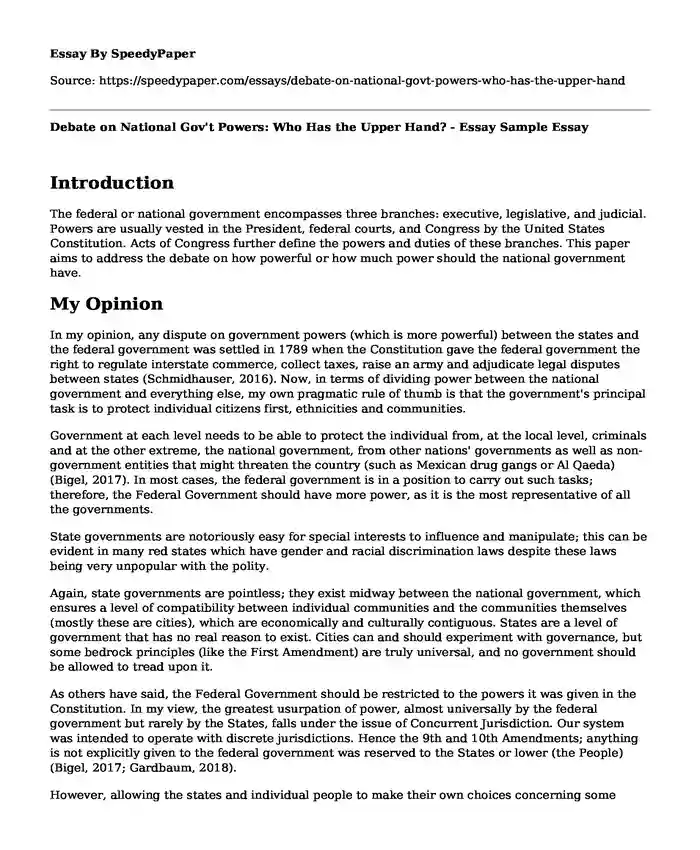
| Type of paper: | Essay |
| Categories: | Political science Government |
| Pages: | 3 |
| Wordcount: | 639 words |
Introduction
The federal or national government encompasses three branches: executive, legislative, and judicial. Powers are usually vested in the President, federal courts, and Congress by the United States Constitution. Acts of Congress further define the powers and duties of these branches. This paper aims to address the debate on how powerful or how much power should the national government have.
My Opinion
In my opinion, any dispute on government powers (which is more powerful) between the states and the federal government was settled in 1789 when the Constitution gave the federal government the right to regulate interstate commerce, collect taxes, raise an army and adjudicate legal disputes between states (Schmidhauser, 2016). Now, in terms of dividing power between the national government and everything else, my own pragmatic rule of thumb is that the government's principal task is to protect individual citizens first, ethnicities and communities.
Government at each level needs to be able to protect the individual from, at the local level, criminals and at the other extreme, the national government, from other nations' governments as well as non-government entities that might threaten the country (such as Mexican drug gangs or Al Qaeda) (Bigel, 2017). In most cases, the federal government is in a position to carry out such tasks; therefore, the Federal Government should have more power, as it is the most representative of all the governments.
State governments are notoriously easy for special interests to influence and manipulate; this can be evident in many red states which have gender and racial discrimination laws despite these laws being very unpopular with the polity.
Again, state governments are pointless; they exist midway between the national government, which ensures a level of compatibility between individual communities and the communities themselves (mostly these are cities), which are economically and culturally contiguous. States are a level of government that has no real reason to exist. Cities can and should experiment with governance, but some bedrock principles (like the First Amendment) are truly universal, and no government should be allowed to tread upon it.
As others have said, the Federal Government should be restricted to the powers it was given in the Constitution. In my view, the greatest usurpation of power, almost universally by the federal government but rarely by the States, falls under the issue of Concurrent Jurisdiction. Our system was intended to operate with discrete jurisdictions. Hence the 9th and 10th Amendments; anything is not explicitly given to the federal government was reserved to the States or lower (the People) (Bigel, 2017; Gardbaum, 2018).
However, allowing the states and individual people to make their own choices concerning some issues is absurd; this causes discontinuity of such things as fundamental minority rights across the land. State or individual people can discriminate against certain minorities in some states; this applies to blacks, transgender, and others. States also can refuse to serve certain minorities or even evict them from their apartments or fire them from their jobs. Voter suppression works better in some states; human rights violations are especially prevalent in conservative red states.
Conclusion
While some local governance is reasonable and needed, states should fall in line with the government regarding fundamental human rights issues, which is often not the case. Therefore, I fancy the federal government should have the final say on many issues such as those mentioned and enforce them uniformly across the land with no discrimination.
References
Bigel, A. (2017). Review of the fallacies of states’ rights. American Review of Politics, 36(1), 106-108. https://journals.shareok.org/arp/article/view/942
Gardbaum, S. (2018). What makes for more or less powerful constitutional courts. Duke J. Comp. & Int'l L., 29, 1. https://scholarship.law.duke.edu/cgi/viewcontent.cgi?article=1535&context=djcil
Schmidhauser, J. R. (2016). The Supreme Court as Final Arbiter in Federal-State Relations, 1789-1957. UNC Press Books. https://uncpress.org/book/9780807879375/the-supreme-court-as-final-arbiter-in-federal-state-relations-1789-1957/
Cite this page
Debate on National Gov't Powers: Who Has the Upper Hand? - Essay Sample. (2023, Sep 13). Retrieved from https://speedypaper.com/essays/debate-on-national-govt-powers-who-has-the-upper-hand
Request Removal
If you are the original author of this essay and no longer wish to have it published on the SpeedyPaper website, please click below to request its removal:
- Literature Evaluation Paper Sample for Free
- Essay Example on the Examining the Activities of the Green Party
- Earth Science Essay Sample
- Encyclopedia Preliminary Research. Essay Example.
- Free Essay about Diversity in the Workplace: Public Administration
- Powers of the National Government, Free Essay for Everyone
- Peroxisomes: Tiny Structures with Big Roles in Eukaryotic Cells - Essay Sample
Popular categories




